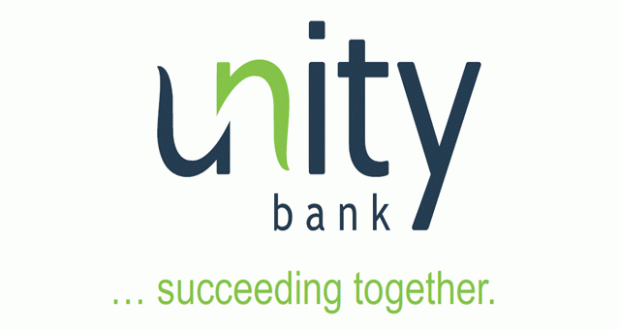Banking
Milost to Invest $1b in Unity Bank, Targets 30% Stake

By Modupe Gbadeyanka
An American private equity firm, Milost Global Inc, is looking to inject as much as $1 billion to recapitalize Nigeria’s Unity Bank Plc, which is struggling to build buffers after a slowdown in Africa’s biggest economy, according to two people familiar with the matter, Bloomberg is reporting.
It was reported that the US-based company will get an initial stake of about 30 percent in Unity Bank, which is listed on the Nigerian Stock Exchange (NSE) in exchange for its first equity investment of $250 million.
Relying on two persons believed to be aware of talks on the alleged transactions, Bloomberg reports that Milost plans to invest $700 million in equity and $300 million in five-year bonds that can be converted into shares in the Nigerian lender.
However, the transaction is still subject to a due diligence as well as regulatory approvals, but the first part of the deal may be completed in the second quarter.
The rest of the cash will be drawn down in intervals over a period of four years, provided Unity Bank has sufficient shares to issue to Milost, one of the people said.
Some small- and mid-sized Nigerian lenders are battling to rebuild capital levels after a slump in oil prices triggered a foreign-currency shortage and a contraction in the country’s economy in 2016 made it difficult for businesses to repay loans.
Unity Bank, which was formed out of the merger of nine banks between December 2005 and March 2006, said in April last year that it is in talks to sell its non-performing loans to avoid penalties after missing a deadline set by regulators on its recapitalization plans.
An investment in Unity Bank will be Milost’s third in a publicly traded Nigerian company since it agreed to pump $350 million into oil-services company Japaul Oil & Maritime Services Plc in February and to provide a $250 million financing facility to Resort Savings & Loans Plc. Several calls to the numbers listed on Milost’s website have gone unanswered, Bloomberg said.
The private-equity firm is targeting companies that trade at less than half of their intrinsic value using a facility combining debt and equity that it calls the Milost Equity Subscription Agreement, it said in an emailed statement on Monday.
Milost buys shares of a company at a minimum 50 percent premium to its market value, and then pegs this price over the next 90 days. If the stock fails to exceed this threshold, the target company will pay the difference to Milost in the form of extra stock, and a penalty of 10 percent to 20 percent of the discount that the share is trading at over a five-day period, it said.
“The Milost Equity Subscription Agreement is a growth instrument that creates and builds confidence in the stock of the companies in which it invests,” the company said. The targeted company cannot draw down the full committed facility in one tranche and is only allowed to use it from time-to-time over a three- to five-year period, with Milost eyeing a seven- to nine-year horizon for an exit, it said.
Milost is taking a bet on Unity Bank as the economy of Africa’s largest oil producer shows signs of recovering from a recession after three straight quarters of expansion in gross domestic product, which the International Monetary Fund estimates will grow 2.1 percent this year.
Net income at Unity Bank slid almost 54 percent to N2.18 billion ($6.1 million) in the 12 months through December 2016, with assets of N493 billion, according to the company’s latest annual report.
Its NPLs stood at 48 percent in 2016, when it reported its second straight year of negative capital adequacy ratios, the report showed. The stock has gained 10 percent this year, giving Unity Bank a market value of N15.8 billion.
Nigeria’s banking regulator allows lenders to count certain classes of debt and equity among the buffers that they need to set aside to survive market turmoil without causing risk to the financial system. Capital adequacy ratios across the banking industry worsened to 11.51 percent in June from 14.78 percent a year earlier, according to the central bank.
Banking
Banks Risk N150m Fine for Giving Hawkers New Naira Notes

By Modupe Gbadeyanka
Any bank caught supplying minted Naira notes to currency hawkers will have to pay a fine of N150 million, the Central Bank of Nigeria (CBN) has warned.
In a circular issued over the weekend by the acting Director of Currency Operations Department of the central bank, Solaja Olayemi, it was stated that it was becoming embarrassing that new banknotes are hawked at social events when most Nigerians are unable to get cash from Automated Teller Machines (ATMs) of banks or over-the-counter.
The banking system has witnessed shortage of cash for a while, with most ATMs not dispensing cash to customers despite efforts by the regulator to address the situation.
In the notice, the CBN said the distribution of freshly minted Naira notes illegally to currency hawkers will attract a penalty of N150 million per branch involved.
The apex bank disclosed that to curb the illegal practice, it has ramped up enforcement measures, including spot checks at banking halls, ATMs, and mystery shopping at locations linked to currency hawking.
“Any erring deposit money banks or financial institutions that is culpable of facilitating, aiding or abetting, by direct actions or inactions, illicit flow of mint banknotes to currency hawkers and unscrupulous economic agents that commodify Naira banknotes, shall be penalised at first instance N150 million only, per erring branch and at later instances apply the full weight of relevant provisions of BOFIA 2020,” a part of the circular stated.
The notice stressed the importance of banks strengthening their internal controls, particularly in cash management at branches and during teller operations.
Banking
CBN Insists Old, New Naira Notes Remain Valid Beyond December 31

By Aduragbemi Omiyale
The Central Bank of Nigeria (CBN) has reaffirmed that the old and new Naira notes will continue to be used for financial transactions in the country beyond December 31, 2024.
There had been rumours that the old and redesigned N200, N500, and N1,000 banknotes would no longer be legal tender from Wednesday, January 1, 2025, because the central bank would phase out the notes in compliance with a Supreme Court judgement of November 29, 2023.
But the apex bank, in a statement signed by its acting Director of Corporate Communications, Mrs Hakama Ali, on Friday, clarified that the apex court’s judgement being cited did not authorise the bank to phase out the banknotes by the end of this year.
According to her, the court allowed the CBN to leave the old and new notes to be used concurrently until it decides to gradually phase out the former.
The central bank’s spokesperson urged members of the public to disregard claims suggesting the old series of these denominations would cease to be valid at the end of this year.
She urged them to continue to accept all Naira notes for daily transactions, encouraging banks to also adopt alternative payment methods such as electronic channels to reduce the pressure on physical cash usage.
“The Central Bank of Nigeria (CBN) has observed the misinformation regarding the validity of the old N1000, N500, and N200 banknotes currently in circulation.
“In line with the bank’s previous clarifications and to offer further assurance, the CBN wishes to reiterate that the subsisting Supreme Court ruling granted on November 29, 2023, permits the concurrent circulation of all versions of the N1000, N500, and N200 denominations of the Naira indefinitely.
“For the avoidance of doubt, all versions of the naira, including the old and new designs of N1000, N500, and N200 denominations, as well as the commemorative and previous designs of the N100 denomination, remain valid and continue to be legal tender without any deadlines,” the statement noted.
Banking
Access Bank to Acquire 100% Equity in South Africa’s Bidvest

By Adedapo Adesanya
Access Bank Plc, the banking subsidiary of Access Holdings Plc, has entered into a binding agreement with South African-based Bidvest Group Limited for the acquisition of 100 per cent equity stake in Bidvest Bank Limited.
The deal for the 24-year-old South African lender is due to be completed in the second half of 2025, upon regulatory approval.
This shows Access Bank’s further expansion plans in line with goals set by its late founder, Mr Herbert Wigwe.
The agreement to acquire 100 percent stake in Bidvest Bank reflects Access Bank’s commitment to strengthening its footprint in South Africa and consolidating on its position as the continent’s gateway to global markets as it seeks to optimise the benefits of recent acquisitions and accelerate its transition towards a greater focus on efficiencies.
Bidvest Bank, founded in 2000 is a niche and profitable South African financial institution providing a diverse range of services, including corporate and business banking solutions and diverse retail banking products.
As of its year ended June 2024, Bidvest Bank reported total assets equivalent of $665million and audited profit before tax of $20million.
Upon conclusion of this acquisition, Bidvest Bank will be merged with the bank’s existing South African subsidiary to create an enlarged platform to anchor the regional growth strategy for the SADC region.
This is coming just as the bank opened a new branch in Malta as part of efforts to focus on international trade finance after obtaining a banking licence from the European Central Bank (ECB) and the Malta Financial Services Authority (MFSA).
Access Bank said the licence marks a transformative milestone in bolstering Europe-Africa trade flows.
The Maltese branch was established by Access Bank UK Limited, the subsidiary of Access Bank Plc, which is also the subsidiary of Access Holdings Plc, which is listed on the Nigerian Exchange (NGX) Limited.
-

 Feature/OPED5 years ago
Feature/OPED5 years agoDavos was Different this year
-
Travel/Tourism8 years ago
Lagos Seals Western Lodge Hotel In Ikorodu
-

 Showbiz2 years ago
Showbiz2 years agoEstranged Lover Releases Videos of Empress Njamah Bathing
-

 Banking6 years ago
Banking6 years agoSort Codes of GTBank Branches in Nigeria
-

 Economy2 years ago
Economy2 years agoSubsidy Removal: CNG at N130 Per Litre Cheaper Than Petrol—IPMAN
-

 Banking2 years ago
Banking2 years agoFirst Bank Announces Planned Downtime
-

 Sports2 years ago
Sports2 years agoHighest Paid Nigerian Footballer – How Much Do Nigerian Footballers Earn
-

 Technology4 years ago
Technology4 years agoHow To Link Your MTN, Airtel, Glo, 9mobile Lines to NIN





















